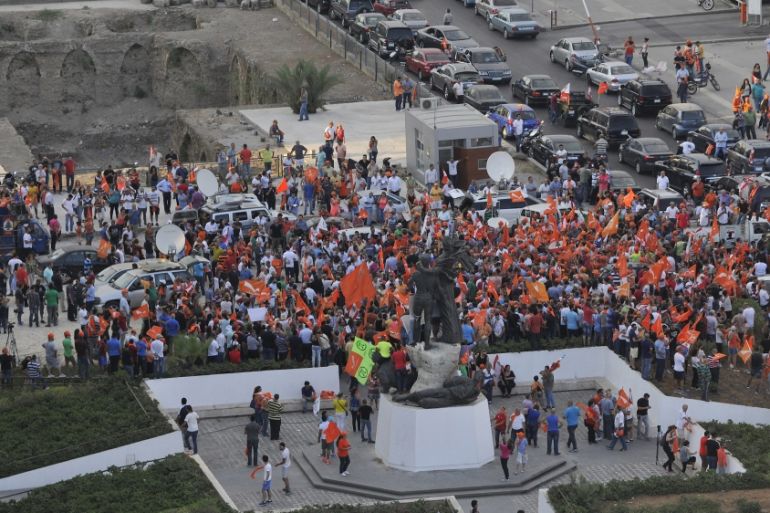Lebanese Christian party rallies for representation
Supporters of Michel Aoun’s Free Patriotic Movement demand end to what they call marginalisation of Christian rights.

Beirut, Lebanon – Thousands of supporters of Lebanon’s Free Patriotic Movement have descended in convoys on the capital’s downtown district to protest against what they consider to be the marginalisation of Christian rights in the country, as well as the extension of the terms of top army commanders.
Early on Wednesday evening, cars decked out in the signature orange colour of the majority-Christian party, the FPM, arrived from different areas of the country and took over the streets heading towards the downtown district of Beirut after its leader, Michel Aoun, called for mass mobilisation.
Cars could be seen blocking the highway from Tripoli to Beirut amid a heavy security presence.
“We are here today to ask for true representation, not just of our community, but of all communities in Lebanon,” said Mario Chamoun, an FPM activist attending the protest.
“This is not just about the extension of the terms of the army generals, but about addressing the issue of the electoral law, elections, and other files.”
RELATED OPINION: Aspiring to impunity in Lebanon
Samir Moqbel, the defence minister, last week extended the terms of Lebanon’s three top army positions, including that of army chief Jean Qahwaji, for another year.
Usually such extensions can only be made by the president, and should otherwise be voted on by the cabinet, but Lebanon has been without a president for over a year, and parliament has so far been unable to vote for a new one.

Opposed to extensions
Aoun has been fiercely opposed to extending the terms of the army commanders, saying new ones should be appointed, and such an extension is in violation of the constitution.
“What the defence minister did is dangerous [for the country],” said Elias Bou Saab, the current education minister and member of the FPM.
“He took the decision that should be made by the government and made it himself.”
In Pictures: Something is rotten in the state of Lebanon
“This is setting a dangerous precedent. It means tomorrow any minister can follow and do the same thing. Where will we end up?”
Many Lebanese Christians feel their rights have been marginalised and that ministers are now taking decisions and acting on powers that are usually reserved for the president, which according to Lebanon’s constitution, is supposed to be a Maronite Christian.
“Christians feel unrepresented and are using this opportunity to vocalise this,” said Ziad, a 39-year-old activist who took part in the protest.
“We are trying to put pressure to introduce change and reform, and this will not be the last time we take to the streets.”
|
|
Thousands of supporters gathered together at dusk in Beirut’s Martyrs Square, wearing orange T-shirts and waving the party flag.
Many came with bottles of champagne and cigars, poking fun at a picture that has been circulating on social media of Qahwaji celebrating his extension, something many Lebanese across the board felt was in poor form, especially considering that the army has over a dozen soldiers still held captive by the Nusra Front and the Islamic State of Iraq and the Levant (ISIL) group following fierce clashes in the border town of Arsal.
“We are against the extension of Qahwaji, and we feel the army is being politicised,” Chamoun said. “So we are protesting to protect the army and its rights too.”
Ziad said: “What we are doing is trying to prevent the corruption of the army, as it is a vital institution for the country.”
Those in opposition to FPM chief Aoun have accused him of having a personal agenda, saying he is trying to secure the presidency for himself and the position of the army chief for his son-in-law, Shamel Rukoz.
Defending the decision taken by Moqbel, the defence minister, they say the extension of the army posts was necessary as the political factions were unable to reach a consensus on new appointments, and that leaving the positions vacant would have led to further instability in the country.